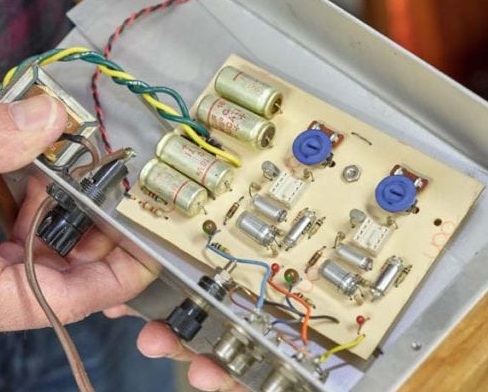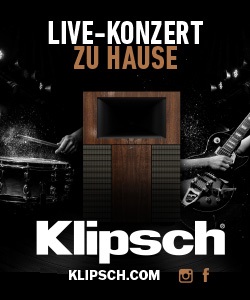"The American high-end forge PS Audio owes its foundation to a chain of coincidences"
During the hot summer of 1973, later PS Audio founder Paul McGowan (the "P" in the company name) was program director of a rock and roll radio station in Santa Ana, California. The station received a reprimand from the Federal Communications Commission (FCC), an independent authority that is responsible in the USA for compliance with certain technical standards in broadcasting. The sound quality of McGowan's radio station left a lot to be desired, so the allegation. The reasons for the lousy sound could be found comparatively quickly with the phono preamplifier used and the transformer with which the studio audio signal is sent to the actual transmitter.
Paul McGowan, who was living in precarious circumstances at the time and was always looking for sources of additional income, recognized the opportunity for himself to earn a few extra dollars. In his spare time he had already constructed and sold music synthesizers and, in his own words, saw the FCC's requirements as “an opportunity to make a little money on the side”. The construction of a new transformer was beyond his possibilities, but he dared to redesign the phono preamps of the studio turntables so that they would sound significantly better. He only had a week window for this.
McGowan found a circuit based on operational amplifiers in a specialist book - and, inspired by it, built a phono preamplifier powered by nine-volt batteries in a cigar box within just one day.
Paul McGowan was enthusiastic about the sound of his debut but got a second opinion from an advertiser for his radio station, a company that made waterbeds. The customer referred him to the waterbed installer Stan Warren (later the "S" of the company name), who turned out to be an avowed audiophile - and recognized the potential of the cigar box phono amplifier, because shortly afterward he founded PS Audio together with Paul McGowan.
A good year later, the amplifier was ready for series production and was sold directly to end customers for an affordable 59.95 US dollars from April 1974 - at a time when the term "high-end audio" had not even been invented. To this day, PS Audio attaches great importance to being an owner-managed family company, although the line-up at the top has changed several times over the past few decades. Stan Warren took his hat off in the early 1980s and founded his own company, which, like PS Audio, devoted itself to developing very good-sounding, yet affordable components for consumer electronics. His successor, Dr. Bob Odell, was also a developer and came from Harman / Kardon. Paul McGowan also saw the PS Audio chapter as finished and went to Arnie Nudell's loudspeaker manufacturer Infinity Systems to help him create the new company Genesis Technologies, in which he was a co-developer of some remarkable sound transducers.
PS Audio was bought by steve Jeffery and Randall Patton, Jeffery and Patton were responsible for the "Ultra" product line (including DACs and CD drives). In the eight years that they ran the company, they took over competitors Ultra Analog and Threshold, among others financial problems that led to the discontinuation of production.
Old love doesn’t rust: Paul McGowan bought back the naming rights to the company that he had once founded and again took over the chairmanship and the post of chief designer, which he still holds today. He rebuilt the company, which had long been based in Boulder, Colorado, and made it fit for a future in which high-quality music reproduction has a lot to do with networking and exploring the possibilities of digital technology.
Paul McGowan and his team see the devices that they produce - including modern DACs that can cope with the high sampling rates of high-resolution audio files, and streamers with which you can get good-sounding material from your hard drive or from the Internet -, always only as a means to an end. The company philosophy sounds simple: “Music. It's all we do ”-“ Music is everything we do.
PS Audio employs a little over 30 people, over half of them in product development. The company is proud of the vertical range of manufacture: At PS Audio, in many places, they do without those bought-in components that are common in the audio industry, and instead, rely on well-thought-out in-house developments. And although the devices that have sonorous names like “Stellar Gain Cell DAC” or “NuWave Phono Converter” have gone through a considerable amount of manual work and are still screwed together in the United States and not in low-wage countries, they have Maintains affordability that was PS Audio's trademark back in the 1970s. The components are certainly not cheap, but they are inexpensive and are characterized by astonishing versatility.
The Stellar Gain Cell DAC is not just a digital-to-analog converter that helps many old CD players on the jumps and also knows how to decode almost all of the digital formats currently in demand. It is also a preamplifier that even the recording fans will not forget, because it not only has nine (!) Inputs (four analogs, five digital), but also four outputs, including an XLR version for, particularly interference-free transmission. Versatility comes as no surprise when you remember that the second device PS Audio offered in the 1970s was a high-level preamplifier called the "Linear Control Center", which quickly became a whole family of devices. PS Audio was also the first American high-end company to The current NuWave Phono Converter is, as it were, later heir to this product philosophy, which dispenses with frills and frills and is committed to sound: It combines a phono stage for low-output MC cartridges with a DSD / PCM converter, whereby the user is free to choose whether it is analog Looping through signals unchanged or have them converted digitally. Which, among other things, opens up the possibility of capturing vinyl treasures for the digital future in the highest possible quality on a computer hard drive. Dealing with digital technology and its interfaces to the “real world” is also a tradition at PS Audio: Based on one of the first CD players, Paul McGowan built a silver disc turner in the mid-1980s that practically only had the drive-in common with the output device and more as an inkling of it
To this day, devices from PS Audio have nothing to do with the common mass-produced goods. To this end, Paul McGowan, who is actually never satisfied with what has been achieved and who always strives for improvements and meaningful expansion of the portfolio, also deals with making the environment for his creations as optimal as possible. The product range with the devices of the PerfectWave PowerPlant series now also includes high-performance line filters that eliminate the "dirt" that comes out of the line through regeneration, i.e. practically regenerate the line current, including a kind of oscillator for Use comes. The largest model, the P10, is specified with over 1500 watts sinus, which should also be sufficient for very large and powerful audio systems.
PS Audio was originally the only one with the idea of improving the power supply, but a wave kicked off. Today there are a number of companies in the market that have dedicated themselves to improving the sound quality of "food" for consumer electronics devices.
At PS Audio we are of course a few steps further - perhaps because Paul McGowan and his small, dedicated team can implement ideas much faster than a large corporation can. For example, not long ago the idea of a multiplayer was picked up - and countered the flood of well-known cheap devices with the “Direct Stream DAC and Memory Player”, which plays CDs and SACDs and can also access streaming services such as Tidal. At PS Audio, the future has already begun.
https://www.psaudio.com
















.jpg)



0 Comments